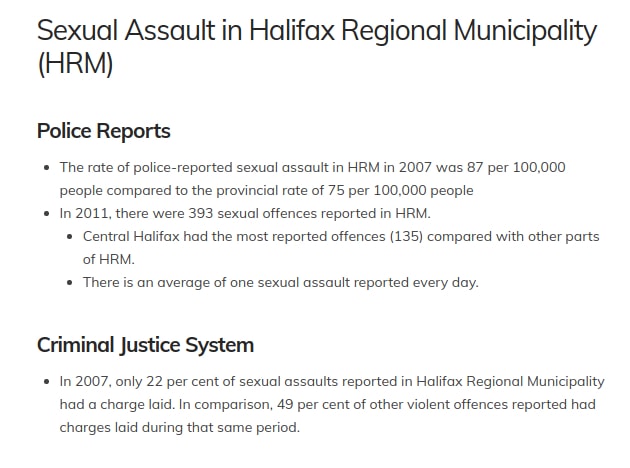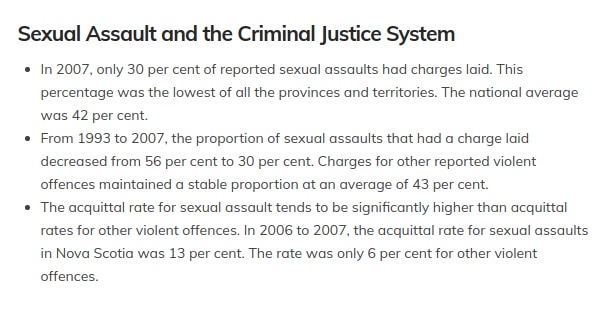KJIPUKTUK (Halifax) – A recent series of articles by the Globe and Mail focusing on sexual assault cases in Canada that have been dismissed, or cleared as unfounded, has brought more attention to the ways these crimes are being dealt with here in Nova Scotia.
According to the Globe’s data, from 2010 to 2014, the rate of unfounded sexual assault cases in Nova Scotia was at 25%, which is more than double that of the national average of 12%. Though the rate for Halifax during this period was 13%, the rate in Truro and other areas was as high as 55%, the fourth highest rate in the country, raising the average rate of the entire province.
The Unfounded classification means that police determined that the reported violation did not happen.
Things are changing for the better
Susan Wilson, the coordinator of the Sexual Assault Nurse Examiner (SANE) program for the Halifax region, works at the Avalon Sexual Assault Centre in Halifax. She says that in Nova Scotia, during the last few years there has been “more focused attention to the issue of sexual assault and how to best investigate those crimes.”

As a SANE, Wilson provides medical and emotional care to those who have experienced sexualized violence within five days of the assault. If requested, SANEs are trained to conduct forensic examinations on victims, and if the police decides to press charges and the case goes to court, SANEs go to court to testify about the case.
Gathering forensic evidence up front is a unique feature of the SANE program, as is giving people the option to store that evidence in hospital for up to six months, buying them more time to decide whether or not to report the crime to the police. In regions that are not covered by the SANE program, this does not occur.
“Not a lot of victims are ready to report to police right away,” Wilson says. “So it’s a really empowering option.”
The SANE program first launched in Halifax in 2001, and has since expanded to include two other branches: one in Antigonish and one in the South Shore.
“Is there a SANE on every corner? Absolutely not. However, we’re going to have much better coverage, from one end of the province to the other. You’ll see that happen in the next few months,” Wilson says.
Currently, sexual assault cases in Halifax are handled by a Sexual Assault Investigation Team (SAIT), which is an integrated major crime unit consisting of the Halifax Regional Police and the RCMP that was founded in 2004.
“The specialized team has more specific and specialized training in the area of sexual assault and in trauma, informed interviewing, those sorts of things,” says Wilson.
“We will hold police accountable, continuously, and our local Halifax Regional Police department wants us to, welcomes that,” she says.
What it tells victims is that ‘it’s not safe to report’
For Wilson, the high number of cases being cleared as unfounded in Nova Scotia and beyond is concerning, but what is more concerning to her is the way in which this issue is presented to the public.
“If a person were to pick up that article in the Globe and Mail and read that, and be victimized tomorrow, how likely are they going to be to report? Not likely,” she says. “What it tells victims is that ‘it’s not safe to report’ and that ‘police aren’t going to believe you,’ and I don’t think that that’s the case overall.”

“We still have a lot of rape myths in society, we have a lot of victim blaming, and so we know that reporting rates are low, anywhere from 6 to 10% typically. So I think there’s a whole societal change that needs to happen for victims to feel believed and supported enough to be able to report that to police.”
Wilson knows firsthand of how these types of cases are handled in Halifax.
The difficulty in investigating these complex crimes intensifies when things such as drugs or alcohol are involved, and according to Wilson, drug and alcohol-facilitated crimes make up half or more of the cases at the Avalon Centre.
“Trauma has a major effect on memory, and so if we don’t understand that victims are not going to have total recall of the details, or they may have scattered or varying pieces of their memory when they’re trying to tell the details of the assault, then it’s really hard for anyone to understand that,” she says. “But if police don’t have that specialized training of understanding of that, and the understanding of the effects of trauma on the brain, then it’s difficult for them to be able to investigate these crimes properly.”
Here in Nova Scotia, Halifax Regional Police and the RCMP are undergoing trauma-informed training, which Wilson believes to be the key for improving how the police and criminal justice system overall deals with cases of sexual assault. Because at the end of the day, the way these crimes are handled starts with whether or not first responders are able to understand the emotional state of the victim and believe their allegations to be true.
“Police need to start to believe that false reporting doesn’t happen and start by believing the victim. And again our local police here certainly partner with us in that belief and in that response. But I don’t think that all police jurisdictions do that,” she says.
For Wilson and the SANE program team, what was most concerning was the high rates of attrition in these cases, rather than the high rates of unfounded cases.
“In the 91% of founded cases, 41% of victims dropped off, where there could potentially have been a charge laid where they decided not to proceed through the process, and so our bigger question is why did that happen? And so we’re looking at that moving forward,” Wilson says.
In 2016, members of the SANE program published an evaluation of the program, reviewing how it has impacted the ways in which sexual assault cases are dealt with by the criminal justice system in Nova Scotia. Based on data from a 10 year period (from 2005 to 2014), they concluded that the rate of unfounded cases in Halifax was 9%, which differs from the Globe’s rate of 13%, though that analysis was for a five year period only (from 2010 to 2014).
“I feel very good about the methodology that we used and within our age bracket of 16 and up, and so I know that here in the Halifax area that that rate is actually 9%,” says Wilson. “And those numbers were fairly consistent throughout those years, although there were a couple of outliers.”
Despite her issues with the methodology of the Globe study, she does agree with it on one issue: we should know who is making the decision when a case is cleared as unfounded, in all cases, across the board.
“One of the things that they highlighted and I actually concur with is that under no circumstances should a first responder make the determination as unfounded,” she says.
To read the review of the impact of the SANE program from 2005 to 2014, click here.
Note: an earlier version of this story incorrectly suggested that SANEs are actually involved in police investigations or in determining whether a crime occurred.
See also: Beyond belief – Numbers of unfounded sexual assault cases inconsistent across Nova Scotia
If you can, please support the Nova Scotia Advocate so that it can continue to cover issues such as poverty, racism, exclusion, workers’ rights and the environment in Nova Scotia. A pay wall is not an option, since it would exclude many readers who don’t have any disposable income at all. We rely entirely on one-time donations and a group of twenty or so dedicated monthly sustainers.



